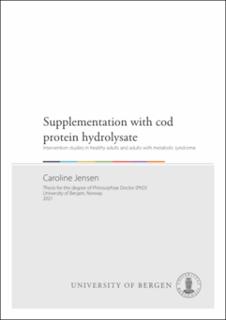| dc.contributor.author | Jensen, Caroline | |
| dc.date.accessioned | 2021-03-18T14:09:12Z | |
| dc.date.available | 2021-03-18T14:09:12Z | |
| dc.date.issued | 2021-03-26 | |
| dc.date.submitted | 2021-03-10T09:53:57.956Z | |
| dc.identifier | container/0b/cd/a2/34/0bcda234-1eab-4f6c-ae18-f27ac8e5ab89 | |
| dc.identifier.isbn | 9788230854105 | |
| dc.identifier.isbn | 9788230865101 | |
| dc.identifier.uri | https://hdl.handle.net/11250/2734286 | |
| dc.description.abstract | Background: Metabolic syndrome (MetS) is a cluster of metabolic disturbances, including hyperglycaemia, hypertension, dyslipidaemia and abdominal obesity, increasing the risk of non-communicable diseases, such as cardiovascular disease and type 2 diabetes mellitus. Animal and clinical studies have observed favourable effects on glucose regulation and lipid metabolism after the intake of fish protein. As large amounts of residual raw materials are generated within the fishing industry every year, it is of interest to investigate if these already harvested marine resources may have similar beneficial metabolic effects in human.
Aim: To investigate the effect of supplementation of hydrolysed proteins, made from residual materials from cod fillet production, on glucose metabolism in healthy adults and components of MetS in overweight and obese adults.
Methods: Three clinical intervention studies were conducted. Study 1 was a randomised, double-blinded crossover trial in 41 healthy adults aged 40-65 years. The study included two study visits, with 4-7 days washout period in between the visits. The intervention was 20 mg/kg body weight (BW) of cod protein hydrolysate (CPH), or casein as control, given before a standardised breakfast meal. Study 2 was a dose-range crossover study in 31 adults aged 60-80 years old. The participants received four different weight-adjusted doses of 10, 20, 30 or 40 mg/kg BW of CPH in random order. Each dose level was taken daily for one week, with seven days washout period between different dose levels. The primary outcome of Study 1 and 2 was postprandial response in glucose metabolism, measured by serum samples of glucose, insulin and plasma glucagon-like peptide 1 (GLP-1) (Papers I and II). Study 3 was a randomised, double-blinded placebo-controlled trial in 30 overweight or obese adults with MetS. The participants received a once-daily supplementation of 4 g of CPH (n=15) or placebo (n=15) for 8 weeks. The primary outcomes were fasting and postprandial response in glucose. Secondary outcomes were changes in other components of the MetS, body composition, total serum cholesterol, insulin, GLP-1, ghrelin, inflammatory markers and adipokines (Papers III and IV).
Results: The postprandial insulin concentration was statistically significantly lower when subjects were given one single dose of CPH compared to control, with no statistically significant differences observed for postprandial concentrations of glucose or GLP-1 (Paper I). We observed no differences in estimated maximum value of glucose, insulin or GLP-1 when comparing the lowest dose of 10 mg/kg BW of CPH with the higher doses (20, 30 or 40 mg/kg BW) (Paper II). In subjects with MetS, supplementation with CPH for 8 weeks had no effect on postprandial glucose, insulin or GLP-1, lipid profile or body composition, when compared to placebo (Paper III). Furthermore, no effect on circulating levels of ghrelin, adiponectin, leptin or inflammatory markers were observed after CPH supplementation (Paper IV).
Conclusion: A single dose of CPH given before a standardised breakfast meal, resulted in reduced postprandial insulin concentrations in healthy adults, with no effects on glucose or GLP-1 levels (Study 1). We observed no effect of increasing doses of CPH on glucose, insulin or GLP-1 in healthy adults above 60 years (Study 2). A daily intake of 4 g of CPH for eight weeks, was not capable of affecting glucose or lipid profile, body composition, ghrelin, adipokines or inflammatory markers in overweight and obese participants with MetS (Study 3). The possible effects of CPH in subjects with metabolic abnormalities such as MetS should be further explored, due to the limited number of included participants. | en_US |
| dc.language.iso | eng | en_US |
| dc.publisher | The University of Bergen | en_US |
| dc.relation.haspart | Paper I: Dale H.F., Jensen C., Hausken T., Lied E., Hatlebakk J.G., Bronstad I., Hoff D.A.L., Lied G.A.: Effect of a cod protein hydrolysate on postprandial glucose metabolism in healthy subjects: a double-blind cross-over trial. J Nutr Sci. 2018;7: e33. The article is available at: <a href="https://hdl.handle.net/1956/19817" target="blank">https://hdl.handle.net/1956/19817</a>. | en_US |
| dc.relation.haspart | Paper II: Jensen C., Dale H.F., Hausken T., Lied E., Hatlebakk J.G., Bronstad I., Lied G.A., Hoff D.A.L.: Supplementation with cod protein hydrolysate in older adults: a dose range cross-over study. J Nutr Sci. 2019;8: e40. The article is available at: <a href="https://hdl.handle.net/1956/21608" target="blank">https://hdl.handle.net/1956/21608</a>. | en_US |
| dc.relation.haspart | Paper III: Jensen C., Dale H.F., Hausken T., Hatlebakk J.G., Bronstad I., Lied G.A., Hoff D.A.L.: Supplementation with Low Doses of a Cod Protein Hydrolysate on Glucose Regulation and Lipid Metabolism in Adults with Metabolic Syndrome: A Randomized, Double-Blind Study. Nutrients. 2020, 12(7):1991. The article is available at: <a href="https://hdl.handle.net/11250/2734273" target="blank">https://hdl.handle.net/11250/2734273</a>. | en_US |
| dc.relation.haspart | Paper IV: Jensen C., Dale H.F., Hausken T., Hatlebakk J.G, Bronstad I., Lied G.A., Hoff D.A.L. The Effect of Supplementation with Low Doses of a Cod Protein Hydrolysate on Satiety Hormones and Inflammatory Biomarkers in Adults with Metabolic Syndrome: A Randomized, Double-Blind Study. Nutrients. 2020, 12(7):1991. The article is available at: <a href="https://hdl.handle.net/11250/2734280" target="blank">https://hdl.handle.net/11250/2734280</a>. | en_US |
| dc.rights | In copyright | |
| dc.rights.uri | http://rightsstatements.org/page/InC/1.0/ | |
| dc.title | Supplementation with cod protein hydrolysate : Intervention studies in healthy adults and adults with metabolic syndrome | en_US |
| dc.type | Doctoral thesis | en_US |
| dc.date.updated | 2021-03-10T09:53:57.956Z | |
| dc.rights.holder | Copyright the Author. All rights reserved | en_US |
| dc.contributor.orcid | https://orcid.org/0000-0003-2714-711X | |
| dc.description.degree | Doktorgradsavhandling | |
| fs.unitcode | 13-24-0 | |
